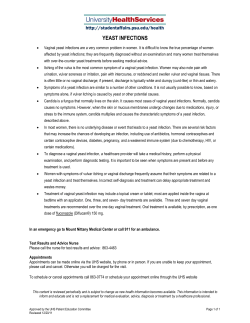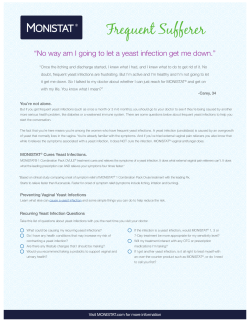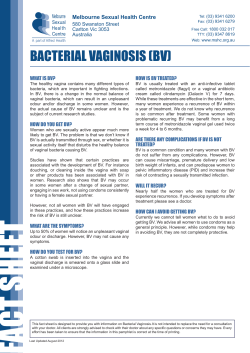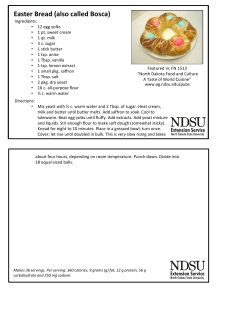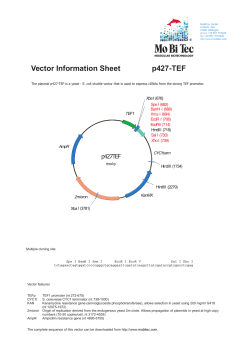
Yeast Infections Description
Yeast Infections Description A yeast infection (also known as candidiasis or moniliasis) is a type of vaginal infection or inflammation associated with genital irritation, itching and/or burning. It is usually caused by the organism Candida albicans which may be normally present in small and harmless amounts on the skin surface, in the mouth, digestive tract and vagina. Under normal conditions, the vagina's pH (alkaline level) and bacterial flora are balanced to keep these microbes in check so that none of them grow excessively. Under certain conditions, the yeast multiply in numbers greater than normal, resulting in symptoms. How do you get it? Certain factors may predispose women to developing yeast infections such as: • recent antibiotic use • hormonal changes (including birth control pills) • worsening control of diabetes Yeast infections can sometimes be passed through sexual intercourse but are often found in monogamous couples and women who are not sexually active. Symptoms The most frequently experienced symptom of a yeast infection is intense vaginal and/or vulvar (external structures of the female genitalia) itching that is often accompanied by burning during urination and/or intercourse. An unusual white curd-like discharge from the vagina may also be experienced and may have an unusually strong "yeasty" smell. When the infection occurs in the mouth, it is called thrush and white patches appear on the tongue and throat. Newborns may develop thrush following birth if the mother has the infection in her vagina. However, thrush in adults is abnormal and should be evaluated by a health care provider. Does it also affect males? While men don't always develop symptoms, a man can occasionally harbor the candida organisms on his penis; men who still have their foreskin intact (uncircumcized) are particularly at risk. In males, symptoms may include itching, reddening and/or irritation of the penis. Consult a health care provider for treatment suggestions or for more information. Diagnosis A sample of the discharge (a wet mount smear) is taken with a swab during an exam and is viewed under the microscope. It is best if these tests are performed when a woman has not: • douched for 24-48 hours • had intercourse for at least 24 hours • used any vaginal medication for at least 48 hours Treatment Yeast infections may be treated by taking oral medications or by creams, ointments or suppositories to the vagina and vulva. Both prescription and non-prescription medications are available. The medicationd should be used for the ENTIRE course of treatment (until the medication is GONE) even if symptoms improve. Not completing treatment as prescribed is a common cause for recurrence. DO NOT discontinue medication when menstruating unless otherwise advised. If using a vaginal medication, you may experience some leakage. A panty liner worn during treatment may make you feel more comfortable. Prevention • Keep your vaginal area dry and well ventilated as much as possible. • Wear loose clothing, preferably made of 100% cotton. • Have male sexual partners wear a condom. • Remove damp bathing suits/work-out clothes as soon as possible. • After a bowel movement, wipe from front to back. • Eat a well balanced diet, get enough rest and exercise to maintain a healthy, natural resistance. • Avoid using detergents that contain dyes, enzymes, and perfumes on any clothing that comes in contact with the vulva. If you have a history of recurrent yeast infections, make sure to inform your health care provider. When receiving antibiotic treatment, ask your health care provider about the possibility of also prescribing yeast prevention medication. Remember Be sure to always consult a health care provider about any abnormal symptoms or changes you may experience in your vaginal area. For more information: Student Health Services . . . . . . . . . . . . . . . . . 619-594-5281 SHS Health Promotion Dept. . . . . . . . . . . . . 619-594-4133 Visit Our Website at . . . . . . . . . . . . . . http://shs.sdsu.edu Rev. 6/10 Student Health Services Division of Student Affairs
© Copyright 2025

